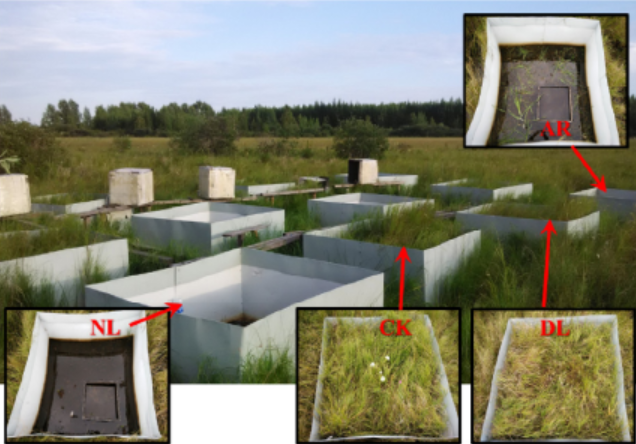Wetlands are considered as the largest nature source of CH4 emissions and contributes to more than 20% of recent global warming, studies on the drivers of CH4 dynamics in wetlands are crucial for predicting CH4 budget under global change scenarios.
To our knowledge, researches on the impacts of wetland plant litter manipulations on CH4 emission and the Q10 values are still limited. To better understand and model the response of CH4 emission to the global climate change, effects of altered litter inputs on the dynamics of CH4 emissions and its sensitivity to temperature should be explored.
Recently, a research group from Northeast Institute of Geography and Agroecology, CAS, conducted the field in situ control experiment in which an increment gradient of litter inputs was conducted in a typical Deyeuxia angustifolia dominant marsh in the Sanjiang Plain.
The objectives of the study were to investigate the pattern of CH4 emission dynamics and the related influencing factors, to assess the variations of labile substrates availability and reveal the temperature sensitivity of CH4 emission under altered plant litter input manipulations.
Researchers found CH4 emission was significantly associated with altered litter input over the observation period. Variances of CH4 emission were more sensitive to litter removal effects. Altered litter input also significantly affected the dissolved organic carbon (DOC) concentration in surface pore water.
The abundance of methanogens among the four treatments exhibited synchronous change with DOC over the observation period. The Q10 values of CH4 emission didn’t show consistent changing patterns with those of DOC among different litter input treatments, which was probably due to the different temperature sensitivity of dominant methanogen types.
This study presents important results on the effects of plant litter input. Due to its great effects on soil microclimate, substrate availability and the concomitant variation in temperature sensitivity, the results highlighted that plant litter effects should be incorporated into the current process-based CH4 biogeochemical models to predict future CH4 fluxes from natural wetlands under the background of global change.

Field experiment of different litter input manipulations

Exponential relationship between CH4 emission and soil temperature at different soil layers under varied litter input manipulations during observation
The research paper by Chao Gong, Changchun Song, Li Sun et al. was published in the Journal of Ecological Indicators.
https://doi.org/10.1016/j.ecolind.2020.106377
Chao Gong, Changchun Song, Li Sun?, Dan Zhang?, Jing Zhang, Xiaohui Liu. Response of methane emissions to litter input manipulation in a temperate freshwater marsh, Northeast China. Ecological Indicators, 2020, 115:106377.